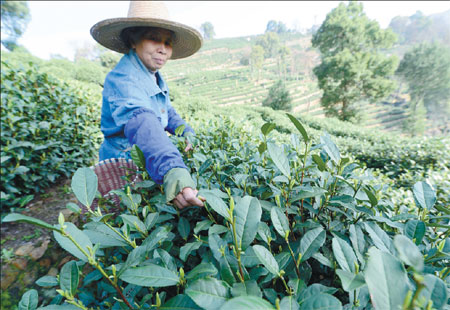Shortage of water won't dilute attraction of famed Longjing tea
The price of Longjing tea, a national beverage of China, will not rise significantly despite a drought last summer because of measures taken by local farmers and the cut in government spending on unnecessary items, said industry insiders.
Longjing tea, also known as Dragon Well tea, from the West Lake area in Hangzhou, East China's Zhejiang province, is a famous variety of green tea and has been a favorite drink for generations of Chinese.
Last year, the price of high-quality Longjing tea, the leaves of which are picked before early April, rose 15 percent year-on-year to 9,300 yuan ($1,500) a kilogram, making it the sixth consecutive year its price had risen, according to the Hangzhou municipal office of agriculture and rural work.
"The lingering heat and drought last summer were quite extraordinary and difficult for tea farmers," said Shang Jiannong, president of Hangzhou Xihu District Longjing Tea Industry Association, which represents more than 70 local Longjing tea merchants, tea farmers and trade companies around the West Lake area.
"The tea trees killed by the summer heat were planted in the past three years and only accounted for 5 percent of the entire tea plantation in the West Lake area," Shang said.
"The fortunate thing is that older Longjing tea trees in the West Lake area weren't severely harmed by the damaging weather and some of them are ready to be picked now."
To ensure successful production, the local government helped tea farmers conduct irrigation and drew water from underground to save their plants in July.
Shang predicted the scope for a price rise for this year's Longjing tea will be set between 5 percent and 10 percent on 2013, mainly driven by the rising costs of tea pickers, processing work and maintenance of tea trees.
The government's anti-extravagance campaign, including cutting the public expenses on luxury products and encouraging frugality have also reduced both government and personal purchases of high-end teas, cigarettes and alcohol since last year.
Because Longjing tea has a history spanning more than 1,000 years and is famous for its strong aroma and sweet flavor, it is frequently given as a present and supplied to Chinese embassies overseas for cultural exchanges. It has been classified into six grades in the domestic market: superior at the top end and then one down to five.
"Although all the tea trees are growing well, the total output of spring Longjing tea will be decided by the weather," said Qi Guowei, general manager of Hangzhou West Lake Longjing Tea Co.
Spring is the crucial season for Longjing tea, and is considered to be the best time to pick the highest quality leaves created by low temperatures and dry conditions. The picking time for Longjing tea in Hangzhou is usually from the middle of March to early April.
"The picking season will be shortened if the temperature rises fast in the meantime, which means that the total output of spring Longjing tea will be reduced," Qi said.
Under such circumstances, tea plantation owners have to scramble to gather enough tea pickers to collect all the spring leaves during the second half of this month; otherwise the fragrance of the tea leaves will disappear.
If the leaves grow too big, all the delicacy of the jade-like leaves fades away, and they cannot be sold for a good price.
With 1,330 hectares of tea plants, the information office of Beijing-based China Tea Marketing Association forecast that the total production of spring Longjing tea in Hangzhou will remain around 3 million metric tons, similar to its output in 2013.
Contact the writer at zhongnan@chinadaily.com.cn and yanyiqi@chinadaily.com.cn
|
A farmer picks tea leaves at a Longjing tea plantation near the West Lake in Hangzhou, Zhejiang province, on March 18.The picking time for Longjing tea in Hangzhou is usually from the middle of March to early April. Li Zhong / For China Daily |



















